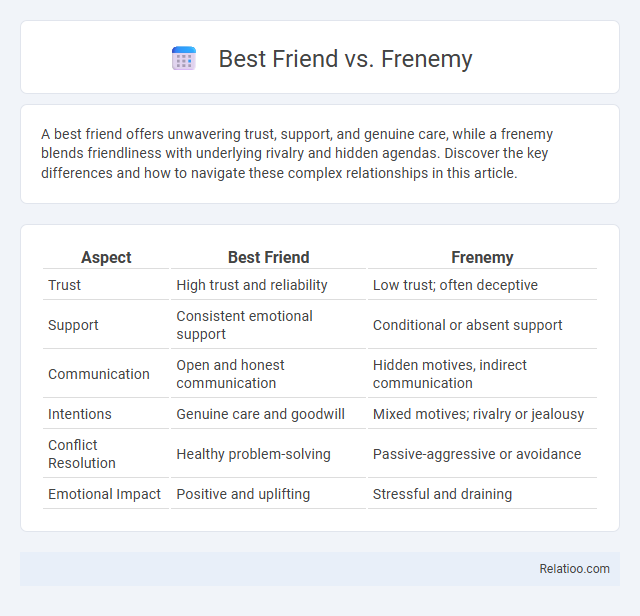A best friend offers unwavering trust, support, and genuine care, while a frenemy blends friendliness with underlying rivalry and hidden agendas. Discover the key differences and how to navigate these complex relationships in this article.
Table of Comparison
| Aspect | Best Friend | Frenemy |
|---|---|---|
| Trust | High trust and reliability | Low trust; often deceptive |
| Support | Consistent emotional support | Conditional or absent support |
| Communication | Open and honest communication | Hidden motives, indirect communication |
| Intentions | Genuine care and goodwill | Mixed motives; rivalry or jealousy |
| Conflict Resolution | Healthy problem-solving | Passive-aggressive or avoidance |
| Emotional Impact | Positive and uplifting | Stressful and draining |
Defining Best Friends and Frenemies
Best friends are characterized by mutual trust, support, and genuine affection, fostering a deep and positive emotional connection. Frenemies exhibit a complex relationship marked by both camaraderie and underlying jealousy, competition, or hidden resentment. Understanding these dynamics helps distinguish authentic friendships from relationships that blend friendship with rivalry or conflict.
Key Traits of a True Best Friend
A true best friend consistently demonstrates unwavering loyalty, genuine trust, and empathetic support, distinguishing them from frenemies or rivals. Unlike frenemies, who often harbor hidden motives, best friends prioritize your well-being without jealousy or competition. Key traits include honest communication, emotional availability, and mutual respect, fostering a relationship grounded in authenticity and lasting connection.
Warning Signs of a Frenemy
Warning signs of a frenemy include inconsistent behavior where kindness abruptly switches to criticism or passive-aggressive remarks, leaving you uncertain about their true intentions. Your frenemy often undermines your achievements or spreads subtle rumors while pretending to offer support. Recognizing these patterns helps protect your emotional well-being and maintain healthy relationships.
Emotional Impact: Best Friend vs Frenemy
A best friend provides consistent emotional support, trust, and genuine care, fostering a sense of security and belonging that enhances mental well-being. In contrast, a frenemy creates emotional confusion and stress through mixed signals, betrayal, and hidden hostility, undermining confidence and causing anxiety. The emotional impact of a best friend is grounding and uplifting, whereas a frenemy often leads to emotional exhaustion and self-doubt.
Communication Styles: Support or Sabotage?
Best friends communicate with empathy and active listening, fostering trust and support that strengthen your emotional bond. Frenemies often use passive-aggressive remarks and mixed messages, subtly sabotaging your confidence and creating confusion. Rivals engage in competitive and direct communication, challenging your abilities but sometimes pushing you toward personal growth through confrontation.
Trust and Loyalty in Friendships
Trust in best friends is solid and unwavering, built on consistent loyalty and mutual support that withstands challenges. Frenemies often display inconsistent trust, blending friendliness with underlying rivalry or hidden agendas that undermine genuine loyalty. Rival relationships lack foundational trust, driven by competition and conflicting interests that prevent authentic loyalty from developing.
Navigating Social Situations with Frenemies
Navigating social situations with frenemies requires recognizing their dual nature of friendship and underlying rivalry, which often involves mixed signals and subtle competition. Establishing clear personal boundaries and maintaining emotional detachment can help manage interactions, reducing stress and potential conflicts. Understanding the fine line between frenemies and genuine rivals allows for strategic engagement, preserving positive relationships while avoiding manipulation.
How to Strengthen Genuine Friendships
Strengthening genuine friendships requires consistent trust-building through honest communication and mutual support, which sets best friends apart from frenemies or rivals who may lack sincerity or harbor competitive tension. You can nurture real connections by actively listening, showing empathy, and prioritizing shared experiences that reinforce loyalty and understanding. Setting clear boundaries and addressing conflicts openly prevents misunderstandings, ensuring your friendships remain authentic and resilient.
Setting Boundaries with Frenemies
Setting clear boundaries with frenemies is crucial to maintain your emotional well-being and prevent toxic interactions. Unlike best friends, who support and respect your limits, frenemies often blur lines to create confusion or drama. Defining what behavior is acceptable and communicating your limits firmly helps protect your energy while navigating complex social dynamics.
Moving Forward: Choosing Healthy Relationships
Choosing healthy relationships involves recognizing the qualities that distinguish a best friend, frenemy, and rival to move forward positively. Best friends provide unwavering support and trust, fostering growth, while frenemies often mask competition with mixed signals that can hinder your emotional well-being. Understanding these dynamics helps you prioritize connections that empower your personal development and happiness.

Infographic: Best Friend vs Frenemy
 relatioo.com
relatioo.com